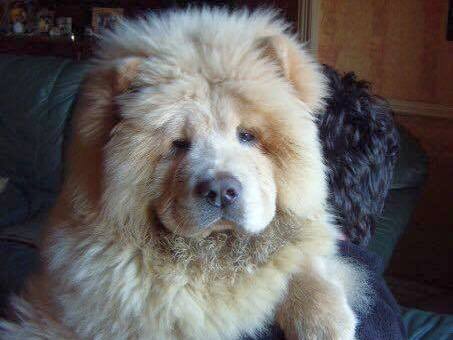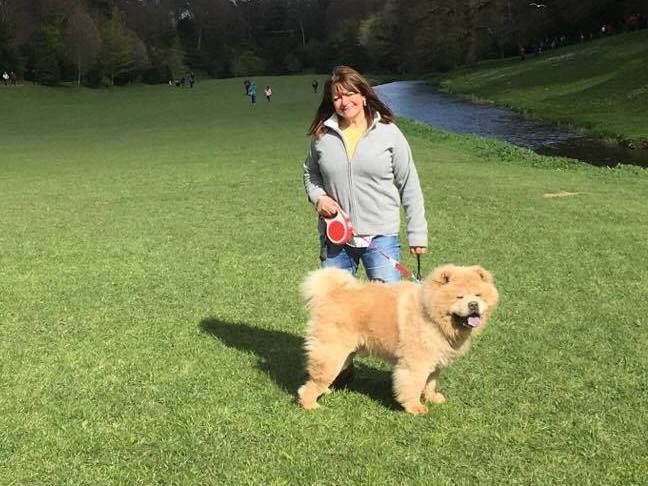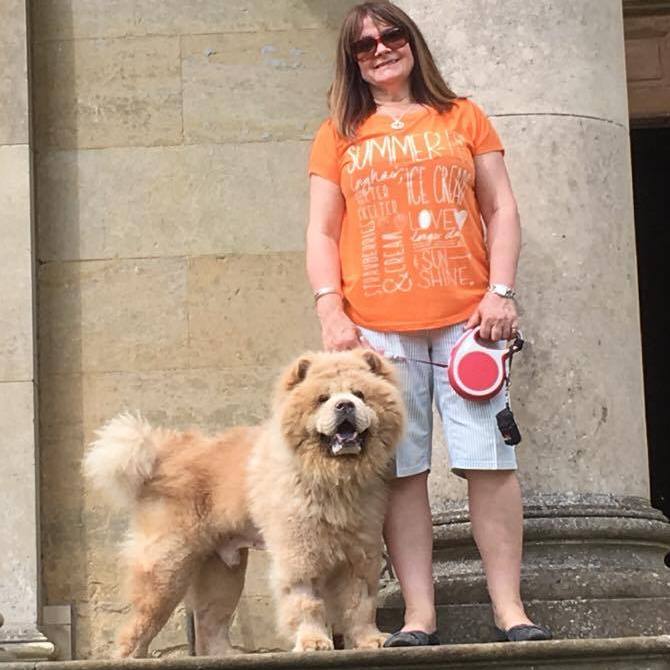Do you need help?
Nine-year-old Icy is the second Chow Chow in the family to be struck down with potentially fatal gastric bloat
A dog owner whose Chow Chow died from GDV has spoken of her shock after the same condition struck another dog in her family.
Now Linda Turner is hoping her experience can educate others to look out for signs of GDV which results in the stomach bloating and twisting.
Linda, 58, lost Chan to the condition when he was nine so when she spotted similar symptoms in Icy, also a Chow Chow, she knew she had to get him to an emergency vet straight away.
Her decision to rush Icy to Vets Now in Preston was almost certainly the difference between him surviving and dying.
Read our comprehensive advice article on GDV in dogs

Chow Chows are susceptible to GDV (Gastric Dilatation-Volvulus) due to years of overbreeding.
Linda said: “When Icy came back from a walk with my partner Paul he was swaying a bit and not his normal self. I took one look at him and realised his stomach was swelling.
“He was pacing around trying to make himself sick. It was awful and obviously distressing.
“Chow Chows are very furry so they look chubby and fat, but it’s all fluff and fur. I could feel his stomach was tight and when you patted him it sounded like a drum.
“Paul wanted to settle Icy, but for me it was like deja vu from what happened to Chan. I knew we had to get him to the vets quickly.”
As it was a Sunday Linda and Paul headed to Vets Now in Preston which provides out-of-hours emergency care in the area – and after a stressful drive from their Chorley home they were seen straight away.
Linda added: “It probably took us an hour between noticing something was wrong to getting him to the vet.
“The vet could hear gas rolling around in Icy’s stomach. If you didn’t know the symptoms you’d probably think your dog had just eaten something disagreeable and try to calm him down.
“That’s what I did with my other dog Chan – I settled him and stayed up with him all night and within five hours he was dead.
“Thankfully, on this occasion, I knew the symptoms. But many people I’ve spoken to since have never even heard of GDV.”
Where is my nearest pet emergency clinic?

With the vet confirming Linda’s fears that Icy was suffering from GDV, she then faced the agonising dilemma of whether to go ahead with major surgery.
She explained: “Icy is nine which is quite old for a Chow Chow and a major operation was a huge ordeal to put him through.
“I was worried the vet would have to remove part of his stomach or take away his spleen and we also had to think about how he’d recover.”
Reassured about how fit and healthy Icy was for his age – and with an x-ray showing that her quick actions had probably saved his life – Linda decided to give the surgery the go-ahead.
It turned out to be the right decision as Icy has returned to his normal self, but only after 10 days of being nursed by Linda.
She said: “The staff at Vets Now were absolutely amazing. Icy would have died if we hadn’t got there in time
“But it was scary and I’ve been telling people about the condition since because everyone likes to stop and talk to Icy when we go out.
“He’s a bit of a celebrity really. People think like a big teddy bear, but to me he’s just an amazing little man.”
Linda Turner Icy's owner“The staff at Vets Now were absolutely amazing. Icy would have died if we hadn't got there in time."

Suggested Tweet
This dog owner saved her Chow Chow's life by being able to spot the symptoms of GDV. Read their story: https://goo.gl/q53ik1 @VetsNowUK!
Emma Donnelly, an emergency and critical care resident at Vets Now, heaped praise on Linda for rushing him to the vet so quickly.
She said: “Icy is still alive thanks to the quick actions of his owner.
“GDV is more common in deep-chested dogs like Chow Chows, but all dog owners should be aware of the symptoms.”
Emma added: “Vets are uncertain exactly what causes GDV, but it’s most commonly seen two to three hours following ingestion of a meal, particularly if it follows strenuous exercise or after drinking a large amount of water.
“Sadly, survival rates are low without prompt treatment so owners who are worried their dog is showing signs of GDV should contact your vet immediately or, out of hours, their nearest Vets Now pet emergency clinic.”
The Vets Now clinic in Preston – where Icy received treatment – was recently rated as “outstanding” in the delivery of emergency and critical care by the Royal College of Veterinary Surgeons.
It’s one of 55 Vets Now clinics and pet emergency hospitals across the UK that are open through the night, seven-days-a-week, and day and night on weekends and bank holidays, to treat any pet emergencies that may occur.
All of Vets Now’s out-of-hours clinics and 24/7 hospitals have a vet and vet nurse on site at all times.
